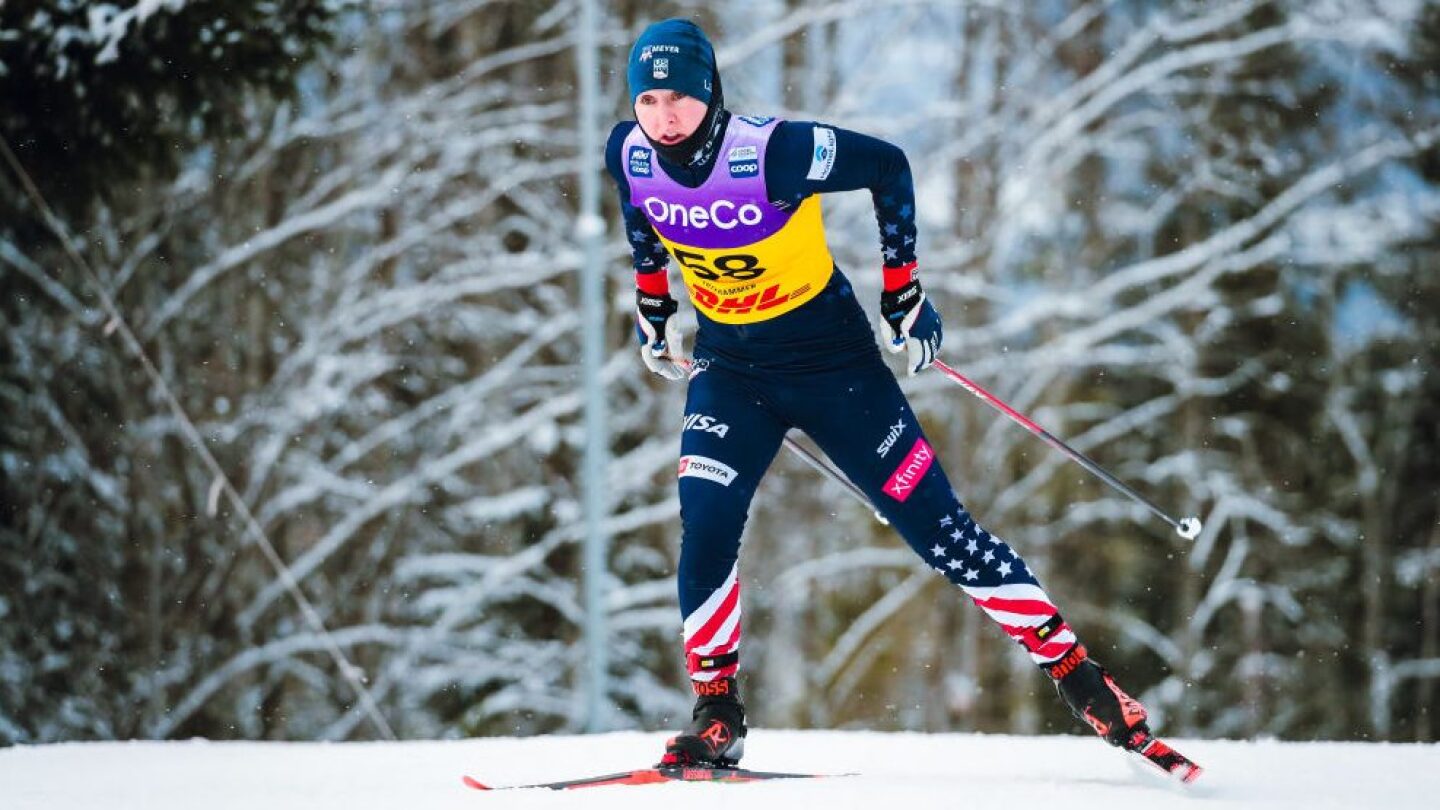The U.S. Olympic cross-country skiing team is set, and it includes a remarkable comeback story.
Hannah Halvorsen, a 23-year-old native of California who lives in Alaska, is headed to her first Winter Games, two years after crossing a street in downtown Anchorage and getting hit by a Jeep. Police estimated the car was traveling 25 miles per hour, she said, confirming previous reports from the Anchorage Daily News and FasterSkier.com.
She landed on the hood, stayed there for 200 yards, then flew off it when the driver braked. She fell onto the road, hitting her head and suffering a traumatic brain injury.
She had a skull fracture and bleeding and bruising in her brain from the Nov. 1, 2019 accident. She broke a tibia and tore her left MCL and PCL completely off the bone.
“I was a hair away from being paralyzed, blind or dead,” Halvorsen said in December 2019, according to U.S. Ski and Snowboard. “I’ve realized what matters, doing what you love, with people you love, and that is skiing.”
MORE: Team USA athlete roster for 2022 Winter Olympics
https://www.instagram.com/p/B5qccMQpIe8/
Halvorsen still has no memory of the accident -- the details came from an eyewitness -- or the 10 days following it. She couldn’t smell or taste for two months afterward, and those senses still aren’t all the way back to normal.
Halvorsen, who has also been open about disordered eating in high school, needed 11 months before she could ski again. She returned to international competition 13 months after the accident in December 2020.
She scored her first career World Cup points (finishing in the top 30) in her second race back. This season, she made a convincing case for an Olympic spot on Dec. 18 by recording her first top-10, a seventh place in a freestyle sprint in Dresden, Germany, one spot above Olympic team sprint champion Jessie Diggins.
Technically, the race didn’t count toward Olympic consideration, but it was impossible to ignore.
Halvorsen’s best race is the freestyle sprint. The event switches every Olympics between the freestyle and classic technique. Fortunately for Halvorsen, it’s freestyle next month in Beijing.
Dresden also marked Halvorsen’s last individual race before the Beijing Games. She ceded a spot in the Tour de Ski in late December due to a cold and concussion-like symptoms -- headaches, dizziness -- that still pop up, residual effects from the accident.
“I seem to be able to fully recover. As long as I can get back in my routine, get rest, I am kind of at 100 percent,” she said. “I can’t handle the non-stop going. But I can clearly race to my full potential when all pistons are firing.”
So Halvorsen waited, through the holidays and into the new year. The Olympic team would not be finalized by a selection committee until mid-January. She said she played mind games with herself. Some days, she thought she was a shoo-in for the eight-woman team. Others, she felt she had no chance.
Finally, last Monday, Halvorsen was home in Anchorage, about 20 minutes from that street crossing, when she received a phone call that she won’t forget. It came from U.S. Ski Team cross-country program director Chris Groves.
You’re in. We picked you, Groves told her. Halvorsen laughed. She cried. She couldn’t control her body because it was so momentous. It’s still hitting her in waves.
“As soon as I got the news, I immediately thought about how, two years ago, at this very time of year, I was relearning how to walk,” she said. “I can remember how I felt when I was relearning how to walk. Full of doubt. There’s so far I have to go, but at the same time, deep inside me, I would feel like I’m going to do this.”
It never crossed Halvorsen’s mind that her Olympic dream, which she harbored since age 12, might not come to fruition.
“That wasn’t really an option because my identity wasn’t being an Olympian. My identity was chasing the Olympics,” she said. “And that was so deeply rooted in me that it couldn’t really be taken away. What was in my head, once I started to wake up and be more present after the accident, was how am I going to prove to everyone else that I’m still in the game?”
Years ago, Halvorsen was part of an up-and-coming group of U.S. cross-country skiers that earned the nation’s first women’s medals in world junior championships history. Halvorsen, Julia Kern, Katharine Ogden and Hailey Swirbul finished third in the relay.
“We don’t perceive ourselves as underdogs that have potential,” Halvorsen said, noting the foundation laid by Jessie Diggins, Kikkan Randall, Liz Stephen and Sadie Bjornsen, among others. “We see ourselves as just as good as anybody.”
Now, Kern, Swirbul and Halvorsen are going to their first Olympics.
“Hannah is one of the toughest people I know, and the strength she has shown through all of this is truly inspiring,” Kern said in December 2019, according to U.S. Ski and Snowboard. “I am always amazed by how Hannah always seems to find the positive side of things and I always seem to find her with a smile on her face, regardless of the situation.”
Diggins, a 2018 Olympic team sprint gold medalist with now-retired Kikkan Randall, leads the Olympic cross-country team. The rest of the roster: Rosie Brennan, Halvorsen, Kern, Sophia Laukli, Novie McCabe. Caitlin Patterson, Swirbul, Kevin Bolger, Ben Ogden, Luke Jager, Scott Patterson, JC Schoonmaker and Gus Schumacher.
OlympicTalk is on Apple News. Favorite us!
https://www.instagram.com/p/CHEdYPrjYWa/?utm_source=ig_embed&ig_rid=8d00bbf1-f255-4ec8-bca8-e0ceaf853230







